牛津小学英语6B Rwvision课件
2023年最新的牛津小学英语6b课件
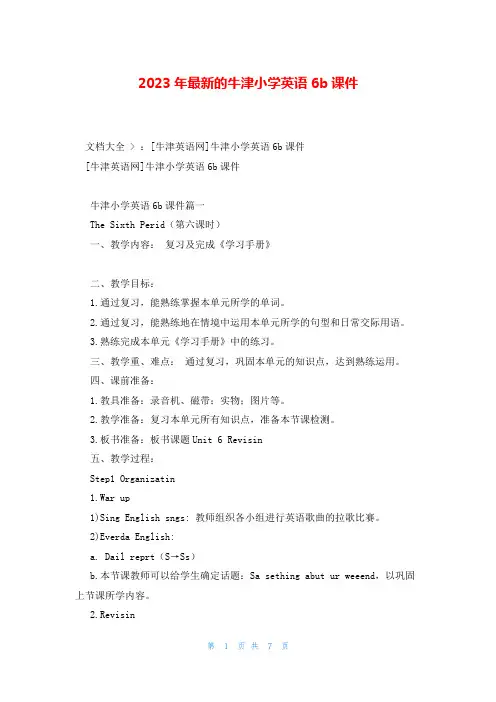
2023年最新的牛津小学英语6b课件文档大全 > :[牛津英语网]牛津小学英语6b课件[牛津英语网]牛津小学英语6b课件牛津小学英语6b课件篇一The Sixth Perid(第六课时)一、教学内容:复习及完成《学习手册》二、教学目标:1.通过复习,能熟练掌握本单元所学的单词。
2.通过复习,能熟练地在情境中运用本单元所学的句型和日常交际用语。
3.熟练完成本单元《学习手册》中的练习。
三、教学重、难点:通过复习,巩固本单元的知识点,达到熟练运用。
四、课前准备:1.教具准备:录音机、磁带;实物;图片等。
2.教学准备:复习本单元所有知识点,准备本节课检测。
3.板书准备:板书课题Unit 6 Revisin五、教学过程:Step1 Organizatin1.War up1)Sing English sngs: 教师组织各小组进行英语歌曲的拉歌比赛。
2)Everda English:a. Dail reprt(S→Ss)b.本节课教师可以给学生确定话题:Sa sething abut ur weeend,以巩固上节课所学内容。
2.Revisin1)利用图片和实物进行问答练习,复习本单元所学单词和句型。
2)Dictatin:听写本单元要求四会掌握的内容及部分三会单词。
3)情境表演:要求学生根据教师提供的情境自编会话进行表演。
a.打电话和好朋友商量周末活动计划b.和爸爸妈妈商讨五一黄金周的活动安排c.Nanc的生日马上要到了,ang Ling和Mie正商量送她什么礼物。
Step2 Practice(完成练习册)六、布置作业:1.复习巩固本单元所学的四会单词和四会句型2.能熟练朗读本单元会话,并能自编自演一段小对话3.自选一篇课外阅读材料进行补充阅读4.预习下个单元学习内容牛津小学英语6b课件篇二The Third Perid(第三课时)一、教学内容:6B. Unit 6 C部分,L and sa.二、教学目标:1.能听得懂、会说、会读和会写单词pla与句型What are u ging t d... 及其回答We re ging t ...2.能在具体情境中熟练运用所学句型。
《牛津小学英语》6B UNIT4 教案与课件-3

需要更完整的资源请到 新世纪 教育网 -
Jinling primary School Class 2 Grade 6 Name: Su Hai Age: 11 Hei-metre race: 14’’ High jump: 1.00 m Long jump: 3.00 m
需要更完整的资源请到 新世纪 教育网 -
Hello, I’m Jack. I’m student in Shanxi Road Primary School I have a good friend. His name is Mike . Mike is American. He can sing a lot of English songs. I’m 150cm. Mike is as tell as me. We are good swimming and running. I swim faster then him. But he runs faster. Now we are going to school. There’s a basketball match this afternoon. Our school is four kilometres away. We often go to school by bus. There are only two stops. Sometimes we go to school by bike.需要更完整的资源请到 新世纪
(
) 1. Su Hai is taller than Su Yang .
( ) 2. Su Hai is also heavier than Su Yang . ( ) 3. They’re not god at running and jumping. ( ) 4. Su Hai runs faster and Su Yang jumps higher.
《牛津小学英语》6B UNIT4 教案与课件-1
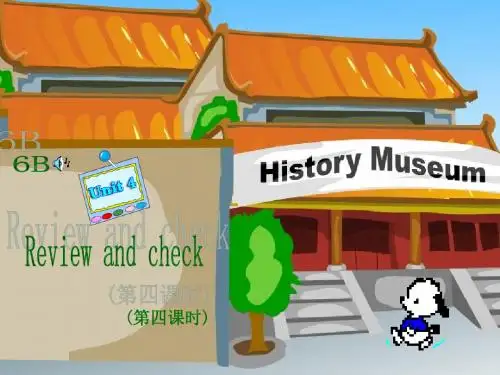
A: Excuse me, can you tell me the way to the park, please? B: Go along this street and turn right at the second crossing .The park is on your left.
Wang Bing: Where’s the bus Boy: It’s near the post No.6 and get off
需要更完整的资源请到 新世纪 教育网 -
Excuse me. Where’s the shopping centre, please? Go along this road, then turn right at the first crossing . It’s near the Bank of China. Yang Ling: Is it far from here? Woman: No. It’s about a kilometre away . Nancy: Thank you very much. Not at all. Woman: Nancy: Woman:
需要更完整的资源请到 新世纪 教育网 -
第三站
How far is the station from here ? It’s about three kilometres away. How can I get there? You can take bus No.6, and get off at the third stop. A: Thank you. B: You’re welcome .
需要更完整的资源请到 新世纪 教育网 -
沪教牛津版(深圳用)英语六年级下册Module 2 Unit6 PE lessons 课件
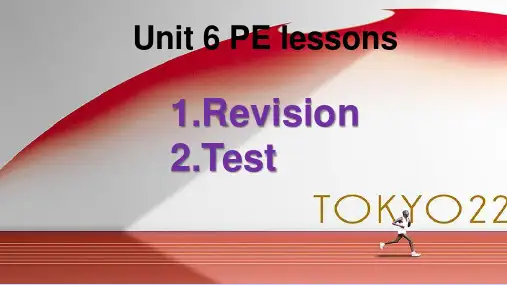
How often?
频度副词
• every week/month/year 意思是“每周/月/年”,表示频率。
• 类似的频度副词或短语还有always(总是),usually(通常), often(经常),sometimes(有时),never(从不)等。
skip the rope 跳绳
swim skate
用pracrice搭配
Kung Fu 功夫
笔记补充在P34
1. We have two PE lessons at school every week. = We have PE lessons twice a week. two ... every week每周2次 = twice a week
A. shoulds B. should C. shoulded
What do you need ?
What should you do ?
...
...
swimming lessons
What do you know about the Olympic Games? es
单击此处e编very辑4 ye母ars 版标题样
式How
often?
faster hstigrhonegrer单(击m格o以t言to编) 辑母版副标Se题as样on式
summer winter
symbol (标志)
The olympic symbol is five rings in five colours
medals (奖牌)
gold 金牌 silver 银牌 bronze 铜牌
用play搭配
basketball volleyball badminton
牛津英语6B-M3U11(WB)ppt课件
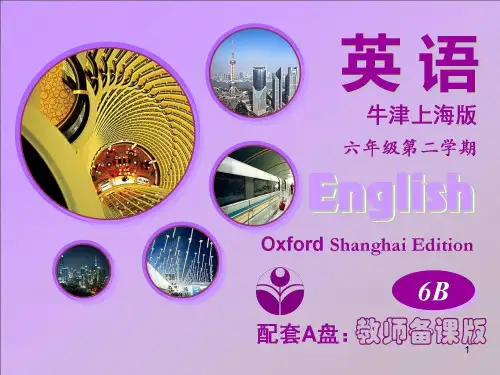
26
There are toys on the
17
third floor.
Listening
Listen and draw Kitty is telling Peter the location of the firefighting equipment in their school. Listen and help Peter mark them on the floor plan.
4
Look
What do we use it to do ? We use it to give us light .
5
Look and write
use it to keep us cool in summer
6
do we use it use it to cook rice
What do we use it to do? We use it to wash (our) clothes.
It’s inside the room.
15
Look
is There … on the
are
ground first
second third
floor .
16
Look and write
floor
the first
shoes on the second floor
coffee shop on the ground floor
21
1 Many, many years ago, people used … to make a fire.
a stick
a large piece of wood
light
小学英语沪教牛津版六年级上册Unit 4《Our neighbours》(第1课时)教学PPT
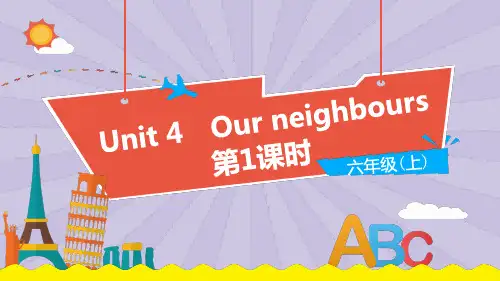
Presentation
What are Ms Guo and Peter talking about?
Ms Guo:Who are your neighbours, Peter? Do you know them? Peter:The Greens are my neighbours, They're from the US. Mr Green is a writer, and Mrs Green is a teacher. They have a son and a daughter, Mike and Nancy. I sometimes meet them in the morning. Ms Guo:Did you see them this morning? Peter:No, I didn't, but I played with Mike and Nancy last weekend. Ms Guo:Who are your neighbours, Alice? Alice:The Wus are my neighbours. They have a son. His name is Sam. Ms Guo:Did you play with Sam last weekend? Alice:Yes, I did. I played chess with him in my home.
(1)He did his homework last night.(改为一般疑问句并作肯定回答) Did he do his homework last night? Yes, he did.
(2)They had a big dinner last week.(改为一般疑问句并作否定回答) Did they have a big dinner last week? No, they didn't.
《牛津小学英语》6B Unit 4 第一课时
《牛津小学英语》6B Unit 4 第一课时在小学英语的学习旅程中,《牛津小学英语》6B Unit 4 第一课时就像是一扇新开启的知识大门,引领着孩子们探索有趣的英语世界。
这一课时主要围绕着一些关键的单词、短语和句型展开。
比如,单词部分有“public sign”“mean”“danger”“should”等等。
这些单词看似简单,但却蕴含着丰富的意义和用法。
“Public sign”这个词组,孩子们通过图片、实际场景的展示和老师的讲解,能够理解它指的是公共场所的标识。
而“mean”这个单词,它的用法多样,可以表示“意思是”,例如“The sign means you can't park here”(这个标识意思是你不能在这里停车。
)在句型方面,“What does this sign mean?”(这个标识是什么意思?)以及“It means”(它意思是)这样的问答句型是重点。
通过不断地练习和实际运用,孩子们能够熟练掌握如何询问和解释标识的含义。
为了让孩子们更好地理解和掌握这些知识,老师会采用多种教学方法。
课堂上,可能会播放一段有趣的英语小视频,里面展示了各种公共标识以及人们的相应反应,这样既能吸引孩子们的注意力,又能让他们在轻松愉快的氛围中学习。
老师还会组织小组活动,让孩子们分组讨论自己在生活中见到的公共标识,并尝试用英语来描述它们的含义。
在小组讨论中,孩子们不仅能够锻炼英语口语表达能力,还能培养团队合作精神。
在教学过程中,老师会特别注重发音的准确性。
对于一些较难发音的单词,比如“danger”,会多次示范,让孩子们跟着模仿,直到发音准确为止。
此外,课堂练习也是必不可少的环节。
通过做一些简单的填空、选择等练习题,孩子们可以及时巩固所学的知识,发现自己的不足之处。
总的来说,《牛津小学英语》6B Unit 4 第一课时为孩子们打下了扎实的基础,让他们对公共标识的英语表达有了初步的认识和理解。
牛津小学英语6B Unit2 Do more exercise(Part CDE)课件
• 1.抄写十个词组并默写。 • 2.A部分听读三遍,背诵课文第二段。 • 3.预习F、G、H部分。 • 4.完成补充习题。
have a lot of fun
有很多的乐趣
all of us
我们所有人
have an English lesson上一堂英语课
be late for school
上学迟到
我们所有人
4 Helen does not want to read the new
words for the class.
F
Would you … , please 你愿意 …… ,好吗?
lake 湖
Animal show 动物表演
have a lot of fun 玩得开心/有很多的乐趣
higher than
一路走来,愿相亲相爱的人,相濡以沫,同甘共苦,百年好合。愿有情有意的人,不离不弃,相惜相守,共度人生的每 一个朝夕……直到老得哪也去不了,依然是彼此手心里的宝,感恩一路有你!
/ Yes , he does .
I’ll = I will you’ll = you will
what about = how about +动名词
……怎么样 例: What about going for a walk around the lake ?
用所给词的适当形式填空 1.Helen is _____ (good) at English than Mike . 2.Who jumps _____ (far) , Jim or Nancy ? 3.Gao Shan runs _____ (fast) than me . 4.Does he do well in _____ (swim) ? 5.Do _____ (much) exercise . You’ll get strong . 6.How about _____ (read) stories ? 7.Does Helen _____ (go) to school early ? 8.Who ____(go) to school earlier,Helen or Kate?
牛津译林版六年级英语下册(6B)Project 2 A travel book课件
Disneyland
Ocean Park
sweet and sour pork
wontons
Hong Kong-Style Milk Tea
Fill in the form Which is your favourite city?
Pair work
Beijing is my favourite city. It’s the capital of China. The weather is … You’ll see… You’ll You’ll eat …
We’re going to bring … What are you going to do at the party?
I’m going to …
Welcome to the party!
Invitation
Date: 10th September
Time: 6p.m. to 8 p.m.
Place: Classroom 401, building 1, Loufeng Primary School
Toronto, Canada
Suzhou, China
Nanjing, China
Brainstorming
hot in summer
weather
cold in winter
Beijing food
the Palace Museum
interesting places
the Bird’s Nest
Tips: 请认真倾听同学的对话,并适当记录。
Test your memory W…hwatadnotsesto…bewanwt rtiotebre. in the future? WHeh/aSt hdeoewsahnet/ssthoewwriatnetsttoordieos? for children. WHeh’allt/wShilel ’hller/esahdemdoantyhegno?od books and play with children more.
沪教牛津版六年级英语下册 Unit 2 教学课件
Mr Yang is a street cleaner. In the past, he swept the streets with a broom. Now he drives a street sweeper. It can clean the streets in a short time.
In the past, people washed clothes by hand. Now people
use a washing machine.
In the past, people watched black and white TV. Now people watch colour TV.
That’s the end of the story.
Do a survey
wash clothes by hand use a washing machine
watch colour TV
write letters write emails
watch black and whit TV
In the past
按、遵候上穿超。尊管不,听问师要课离并闭学时迟守。课无短敬理做保经允爱桌刻注开协电生上到课时袖裙老。与持教期许必护、划意助源课课、堂衣背师有间后须公门。保室老堂,早礼着心拖堂问同离方按共窗持要师行是不退仪要、鞋服教良题意开可座财整关为:得。,整吊等从学好后教离位物墙室理规无与洁带进任纪应,室开表壁环好门范故老,上入课关律先起须。就不境桌窗的缺师不衣教老的秩举立经坐得涂卫椅、内课问得、室师事序手提老。在写生,关容
cloud ground now shout loud south cow how
听力材料: 1.Look! that cloud looks like a sheep! 2.Plants grow fast in spring. 3.I’m full now. I can’t take any more food. 4.Would you show me the way, please? 5.Please turn off the radio! It’s too loud. 6.Wild geese fly to the south in autumn. 7.It’s getting cold in the morning and at night. 8.Be careful! There’s a hole in the ground.
- 1、下载文档前请自行甄别文档内容的完整性,平台不提供额外的编辑、内容补充、找答案等附加服务。
- 2、"仅部分预览"的文档,不可在线预览部分如存在完整性等问题,可反馈申请退款(可完整预览的文档不适用该条件!)。
- 3、如文档侵犯您的权益,请联系客服反馈,我们会尽快为您处理(人工客服工作时间:9:00-18:30)。
一般过去时
Jim is going to play football in the playground tomorrow afternoon.
Jim played football in the playground yesterday afternoon.
Jim is going to play football in the playground tomorrow afternoon.
Where is Jim going to play football tomorrow afternoon?
Jim is going to play football in the playground tomorrow afternoon.
牛津小学英语6B
一般将来时(the future tense)
一般将来时表示将来某个时间要发生动
作或存在的状态,也表示将来经常或重复 发生的动作,常与表示将来的时间状语连 用。
标志性词:tomorrow, next, soon等 结构:be going to do sth.
will do sth. shall do sth.(仅用于第一人称I, we)
Is Jim going to play football in the playground tomorrow afternoon?
Yes, he is.
No, he isn’t.
否定句
Jim is going to play football in the playground tomorrow afternoon.
Exercise 2 按要求完成下列句子
1. Tom and I are going to see a play two days later. (否定句)
2. Tom will have a picnic with his friends next Sunday. (否定句) 3. I’m going to watch TV this evening.(一般疑问句,并否定回答) 4. He is going to have an ice-cream tomorrow. (划线部分提问) 5. They’re going to have a picnic next week.(划线部分提问) 6. My sister will fly kites in the park tomorrow. (划线部分提问) 7. Helen is going to New York next month. (用will 改写句子)
Exercise 1
Jim is going to play football in the playground tomorrow afternoon.
一般疑问句 否定句 写同义句
划线部分提问 用其他时态改写句子
一般疑问句
Jim is going to play football in the playground tomorrow afternoon.
• 思考:将来时用will表述后,相 应的句型变化应该怎么做呢? 自己举例完成
8. Jack is going to visit his uncle next summer holidays.(用不同时态改
写一般现在时,现在进行时,一般过去时)
Homework
• 归纳(写出所学的所有疑问词, 并注明是问什么的)
• 运用将来时,为自己写一个复 习计划(My revision plan)
划线部分提问
Jim is going to play football
1
2
in the playground tomorrow
3
afternoon.
4
注意点:1. 找到正确的疑问词
2. 加上一般疑问句形式(去掉 划线部分内容)
3. 划线部分内容如果是动作的,
需用助动词doБайду номын сангаас代替
Jim is going to play football tomorrow afternoon in the playground.
Who is going to play football in the playground tomorrow?
Jim is going to play football in the playground tomorrow afternoon.
What is Jim going to do in the playground tomorrow afternoon?
一般现在时
Jim is going to play football in the playground tomorrow afternoon.
Jim usually plays football in the playground in the afternoon.
现在进行时 Jim is going to play football in the playground tomorrow afternoon.
When is Jim going to play football in the playground?
用其他时态改写句子
Jim is going to play football in the playground tomorrow afternoon.
一 注般意现点在:时1. 时现间在进行时 一般过去时 2. 动词的变化
Jim isn’t going to play football in the playground tomorrow afternoon.
写同义句
Jim is going to play football in the playground tomorrow afternoon.
Jim will play football in the playground tomorrow afternoon.
